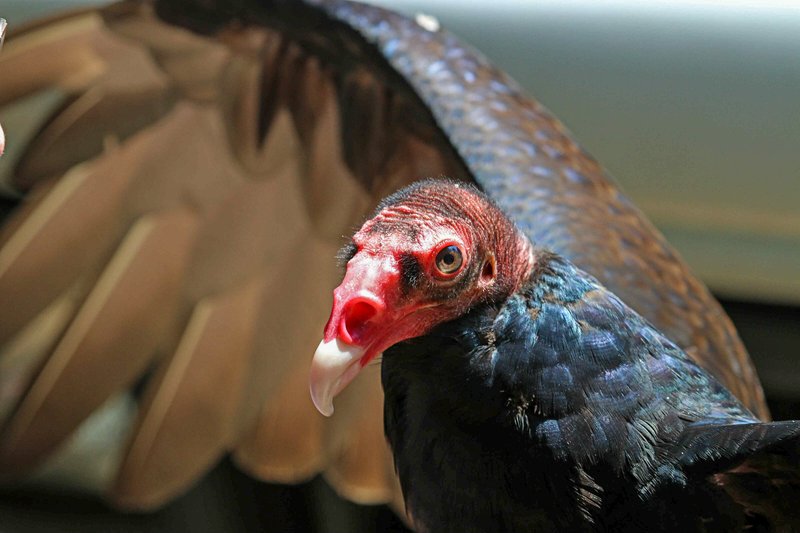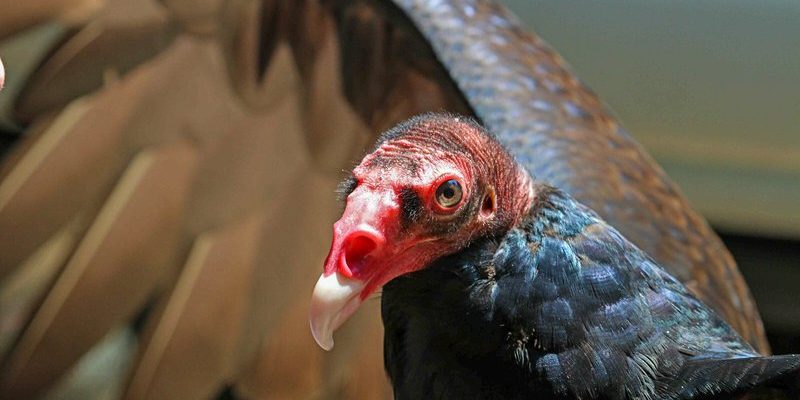
Imagine a bird that almost seems to fly with purpose, gliding effortlessly on thermal updrafts while it hunts for its next meal. But, instead of searching for traditional prey, the turkey vulture is on the lookout for something a little less glamorous: roadkill. Let’s dive into ten surprising facts about these remarkable birds that might just change the way you view them.
1. They Have an Incredible Sense of Smell
You might be surprised to learn that turkey vultures are one of the few bird species that can actually smell their food. While many raptors rely on sight to find their meals, turkey vultures navigate the world through their acute olfactory sense. They can pick up on the scent of decaying flesh from over a mile away, making them experts at locating carrion.
This ability is especially important because their diet mainly consists of dead animals. It’s a bit like having a nose that can sniff out pizza from the other side of town! In a world where fresh meals are hard to come by, this skill gives them a distinct advantage.
2. Their Appearance is Quite Uncommon
Turkey vultures aren’t exactly the most glamorous birds on the block. Their bald heads may look a bit off-putting at first, but there’s a practical reason behind this unique feature. The lack of feathers helps keep them clean as they eat carrion, preventing bacteria from taking hold. Think of it as built-in hygiene!
Interestingly, their dark plumage and striking wingspan can make them look somewhat intimidating when they glide through the sky. With a wingspan of up to six feet, they can often be seen soaring, almost like they’re on a mission to find the next meal.
3. They’re Great for the Environment
Here’s the thing: turkey vultures are more than just scavengers; they’re nature’s waste managers. By consuming dead animals, they help to keep the environment clean and free of disease. Imagine if no one cleaned up after a big party; things would get messy fast!
Without turkey vultures and other scavengers, the world would fill up with rotting carcasses, which can spread disease. Their work ensures that these remains are recycled back into the ecosystem, benefiting plants and other animals. It’s a pretty amazing cycle of life!
4. Turkey Vultures Are Social Birds
You might picture vultures as solitary creatures, but they actually prefer to gather in groups. Turkey vultures can often be seen roosting together in large numbers, sharing information about food sources. It’s a bit like a neighborhood potluck where everyone brings something to share.
When they find food, they’ll often call out to each other, inviting friends to join the feast. This social behavior enhances their chances of survival. After all, there’s strength in numbers, especially when it comes to munching on a big meal!
5. They’re Not Just Found in the U.S.
Turkey vultures are quite versatile in their habitat choices. While they’re commonly spotted throughout North America, they have a wide range that extends into Central and South America as well. Think of them as the world travelers of the bird kingdom.
In fact, many turkey vultures migrate south for the winter, covering impressive distances. They often return to the same breeding grounds each season, showcasing their strong homing instincts. If you ever spot one in your backyard, it might just be a seasonal visitor making its rounds!
6. They Play a Role in Disease Control
Turkey vultures are not just tidy eaters; they’re also critical in controlling diseases. By consuming decaying animals that could harbor harmful pathogens, they help reduce the spread of diseases, such as rabies and anthrax. Imagine them as the unsung heroes of disease prevention!
Their digestive systems are specially adapted to handle pathogens that would harm other animals. It’s like having a superhero stomach! This means they can feast on the leftovers without becoming sick themselves, further aiding in keeping the ecosystem healthy.
7. Their Nesting Habits are Unique
When it comes to nesting, turkey vultures are quite nonchalant. They don’t build elaborate nests like many other birds; instead, they prefer to lay their eggs in protected areas like caves, hollow trees, or even abandoned buildings. It’s really all about finding a cozy spot away from predators.
Typically, turkey vultures lay 2 to 3 eggs, and both parents share incubation duties. You might think they’d be strict parents, but they have a laid-back approach. The young ones are left to fend for themselves pretty quickly after hatching, receiving just enough parental care to start their independent lives.
8. They Have a Unique Defense Mechanism
If threatened, turkey vultures have a peculiar way of defending themselves. Instead of flying away, they often resort to playing dead. If danger is lurking, they might go limp and release a foul odor, making them unappetizing to potential predators. It’s quite the clever tactic, you have to admit!
This strategy not only deters threats but also helps them stay safe from those who might want to feast on them. Think of it as their version of throwing a smoke bomb and sneaking away unnoticed!
9. Their Lifespan is Quite Impressive
Turkey vultures can live surprisingly long lives for birds. In the wild, they can thrive for over 10 years. In captivity, some have even been known to live into their 20s. That’s like the equivalent of a bird reaching retirement age!
This longevity is a testament to their adaptability and role in the ecosystem. The fact that they can survive numerous challenges, from food scarcity to natural predators, gives them an edge in the wild.
10. They’re Not as Related to Eagles as You Might Think
You might be surprised to find out that turkey vultures are more closely related to storks than to the majestic eagles and hawks we often associate with raptors. Evolutionarily, they share a different lineage, which is fascinating in its own right. This surprising connection highlights the diversity of the avian world.
Understanding these relationships in nature can change your perception of these birds. It shows us that there’s much more than meets the eye when it comes to the animal kingdom.
In conclusion, the turkey vulture is an underrated marvel of nature. With their amazing abilities and unique behaviors, these birds play an essential role in maintaining a balanced ecosystem. Next time you see one, remember these facts, and perhaps give a little nod of appreciation to nature’s clean-up crew!

